- Human Resources
- Article
- 6 min. Read
- Last Updated: 02/07/2023
The Job Juggle: Analyzing the Rise of Polywork

Table of Contents
Key Takeaways
- Nearly half of Americans plan to work multiple jobs for more than three years.
- Respondents working just one job are 44% more likely than those working multiple jobs to feel productive.
- Over half of hiring managers view a candidate with multiple jobs as a red flag.
The Age of Overemployment
Time is money, and keen workers are capitalizing on every second. While some struggle to balance even just one full-time job with the rest of their obligations, others are juggling multiple jobs — a lifestyle called “polyworking.”
Paychex surveyed over 1,000 Americans, both polyworkers and people holding just one job, to learn more about the increasing interest in taking on multiple part-time jobs. We then analyzed who had the highest interest in the polywork lifestyle by location and industry.
Why are people becoming polyworkers, and how long do they plan to do it? How are they different from other employees? Whether you have one or multiple jobs, read on to find out what the rest of America is doing to make a living.
Popularity of Polywork
Since 2019, online search volumes about polywork (and related terms like “gig work” and “side hustle”) have risen. We found that residents of certain states are more curious about the concept than others.
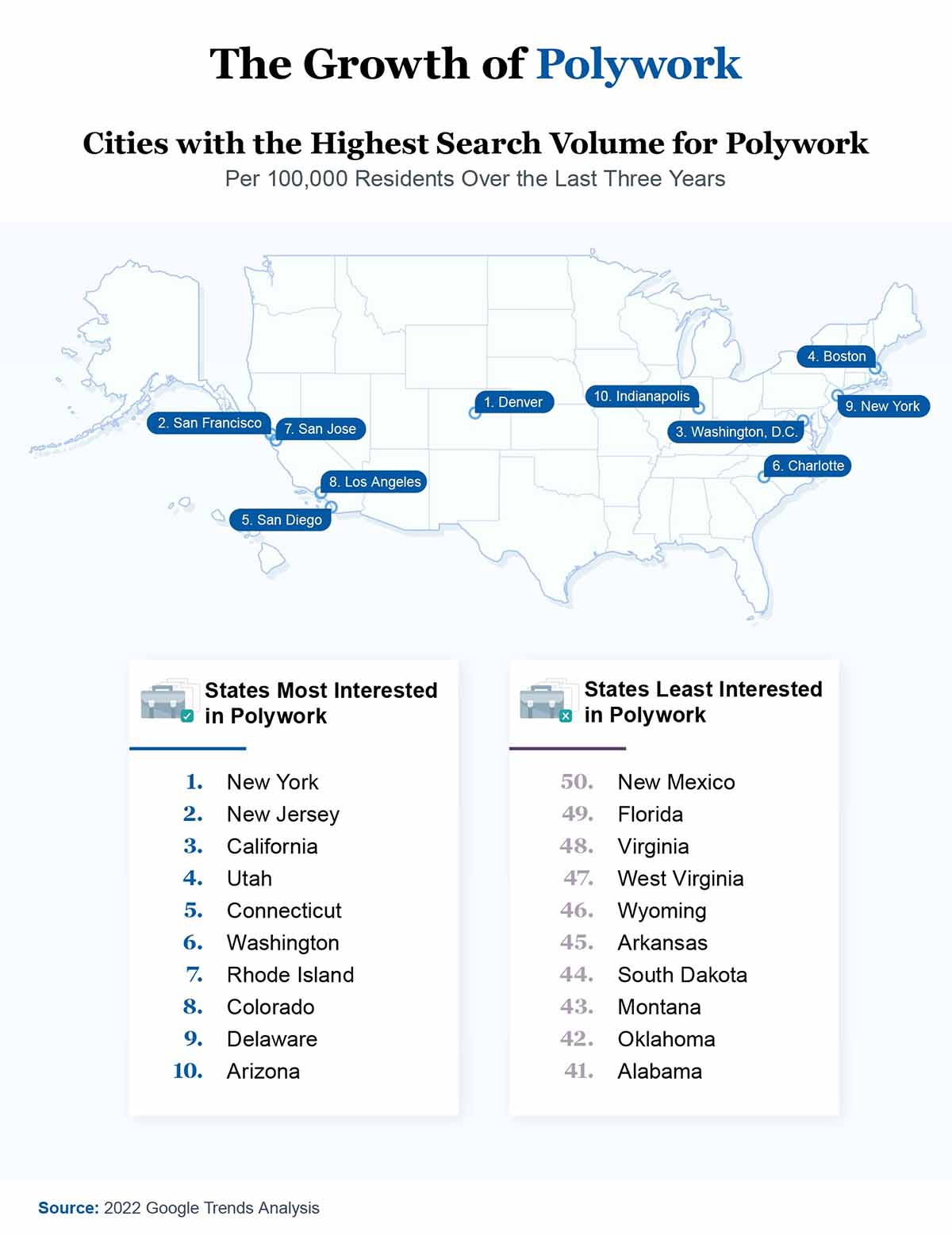
Residents of coastal cities, many of which are also the most expensive cities in the US, appear much more likely to be interested in polywork than residents of cities in the middle of the country. While Denver is a notable exception, six of the top 10 cities with the highest volume of polywork-related internet searches are on the coast. Boston and New York City led the pack in the east, while San Francisco, San Diego, San Jose, and Los Angeles generated the most searches out west.
From a state-by-state point of view, New York, New Jersey, California, Utah, and Connecticut residents are the most interested in polywork. On the other hand, New Mexico, Florida, Virginia, West Virginia, and Wyoming residents don’t care nearly as much.
Either way, there were over 70 million freelancers in the U.S. as of 2022, which is 20% higher than the 2021 headcount. The number of people looking to transition to a multi-job lifestyle could easily keep rising through 2023 and beyond, especially in these places where people seem most keen on researching polywork.
Working Overtime
We surveyed 1,000 people about their work habits, including the number of jobs they currently hold. We asked polyworkers about their job levels, work locations, and ideal scenarios for working more than one job.
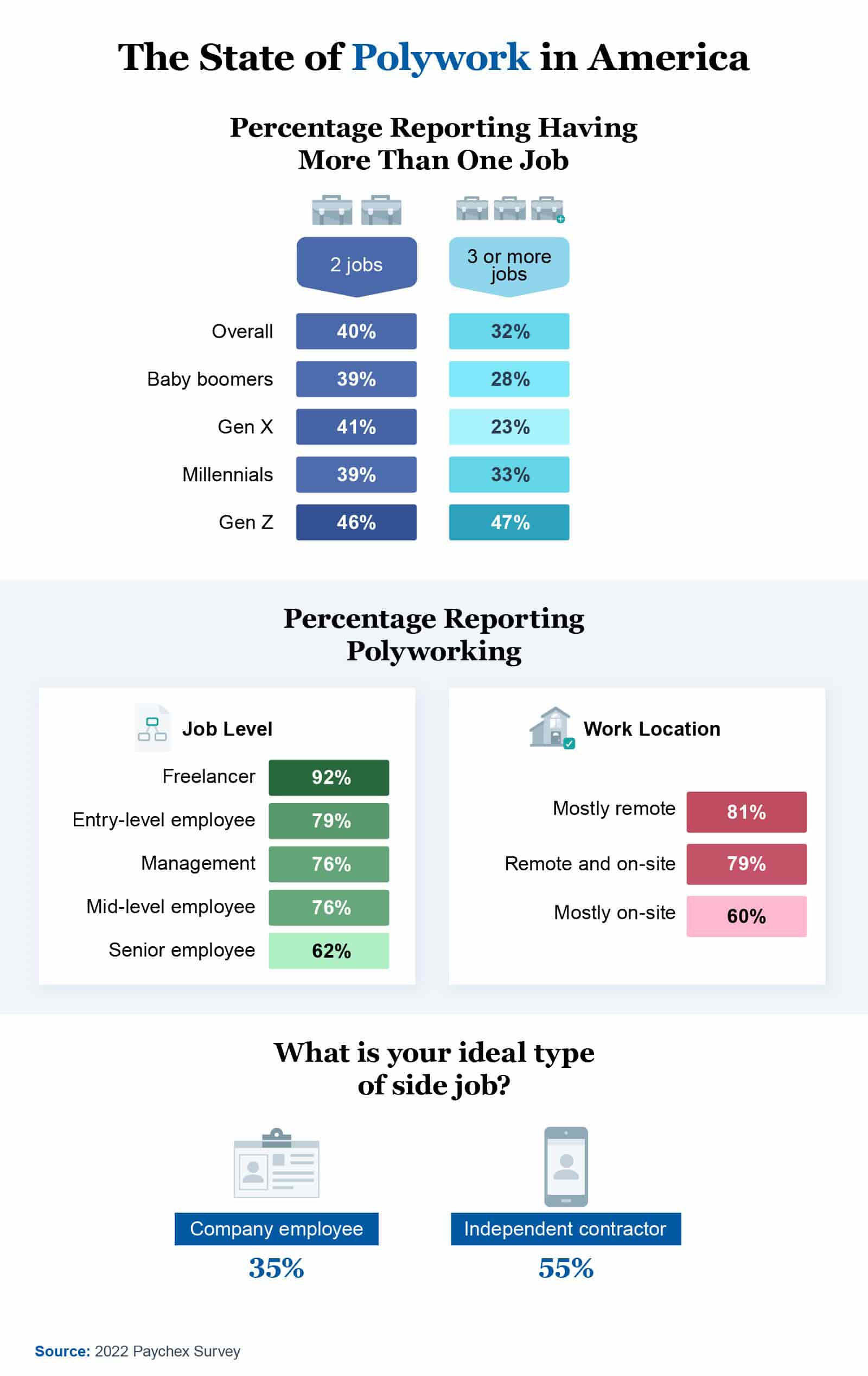
We found that 40% of respondents hold two jobs, while just under one-third juggle up to three or more. Gen Zers are more likely to polywork than other generations, with nearly half of them saying they’re currently employed at two or three places.
Might that mean they’re harder to lock into a single job commitment? To make your business attractive to young workers, consider offering them financial security, flexibility and be open to contract work, while emphasizing your company’s commitment to authenticity and diversity.
The one-job lifestyle isn’t for everyone, and polyworkers are no exception; nearly all the ones we surveyed are freelancers (92%). Most opt for a mostly remote work setting, and it’s easy to assume why: The flexibility of remote work offers the luxury of more easily working two or more jobs. Still, balancing them can be challenging, which might mean some industries are more conducive to polywork than others.
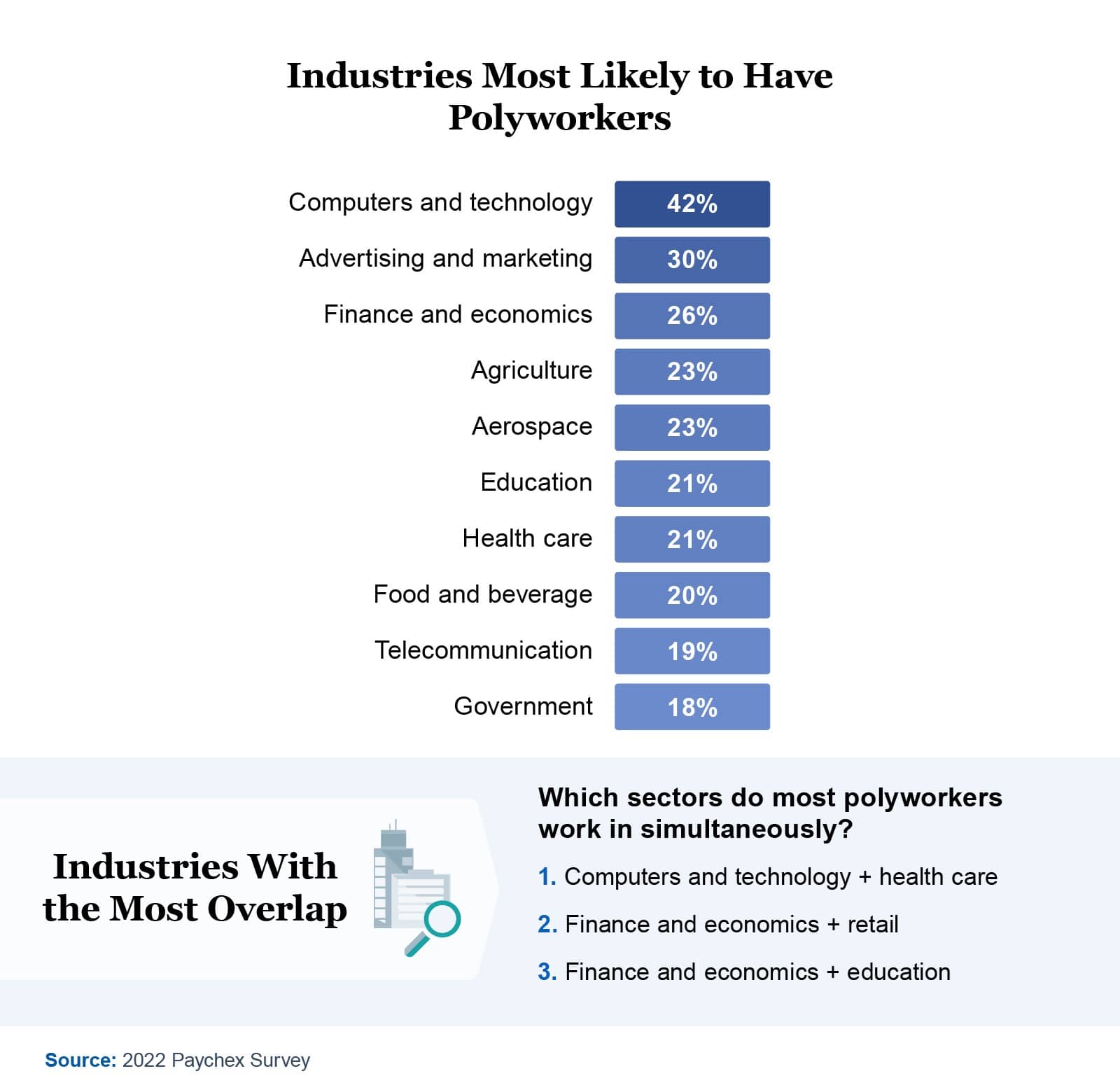
Computer and technology sector workers are most likely to have multiple income streams. This industry also has the most overlap with health care (people working in both simultaneously). While these workers might mix and match the most while working multiple jobs, people from many different professional backgrounds have taken on work in other fields as well. For example, finance and economics workers overlap with the retail and education sectors quite a bit, too.
Numerous Obligations
Whether polyworkers hold jobs in multiple industries or not, their plans may or may not be long-term. How long do they intend to keep it up, and why?
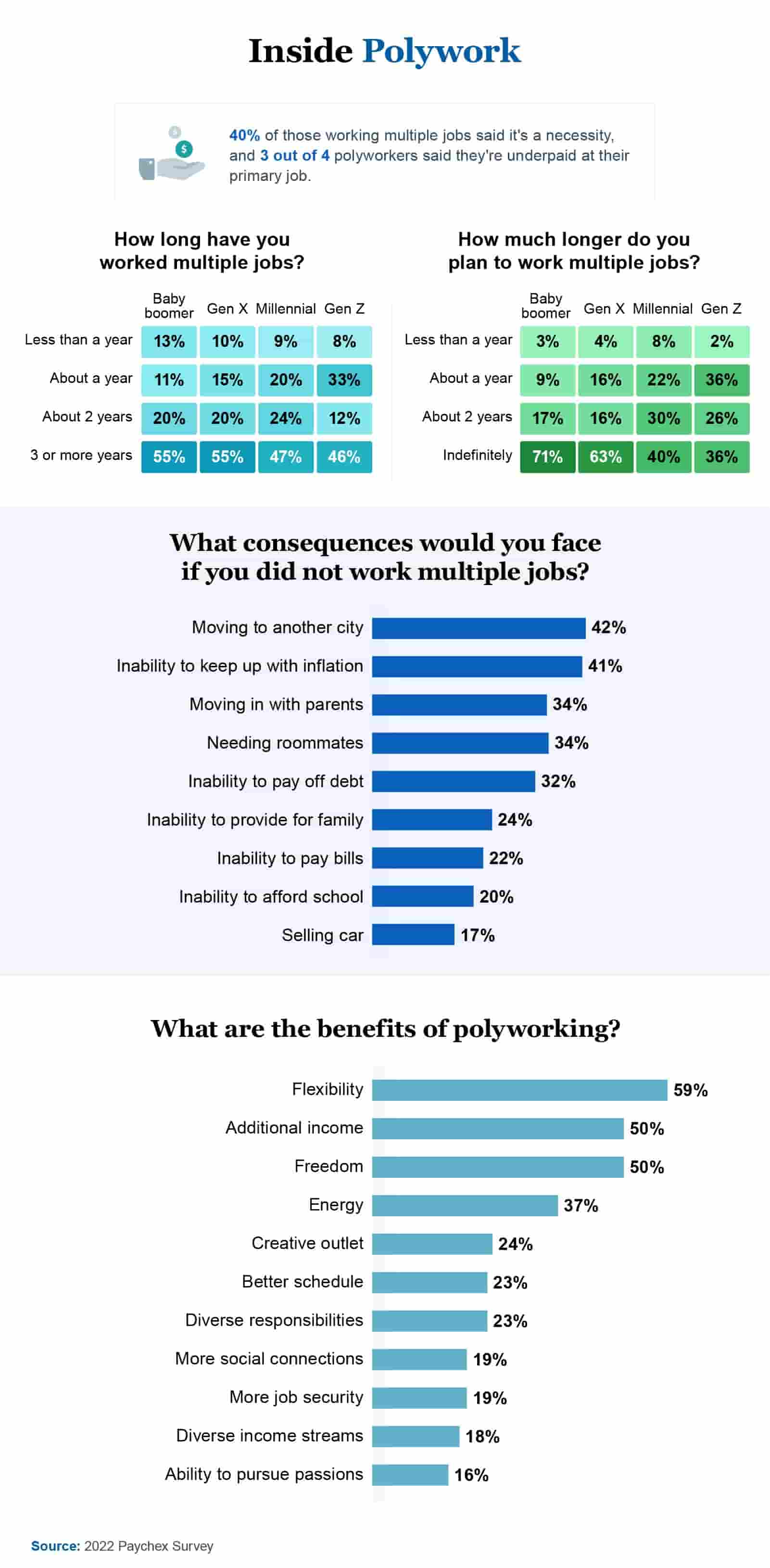
Nearly half of our respondents are polywork veterans, having worked multiple jobs for three or more years. Gen X has been working multiple jobs for the longest time, with 32% saying they have done so for five years or more.
But it’s not just Gen Xers who are long-term polyworkers. Almost half of respondents plan to polywork indefinitely (47%), and their motivation varies. Without multiple income streams, Gen Xers and millennials most fear the possibility of having to move to a new home, while baby boomers are particularly worried about their inability to keep up with inflation.
That’s one reason flexibility, additional income, and freedom are important to polyworkers. Having autonomy over their workloads and schedules allows them to structure their day however they need to, which is especially helpful to freelance polyworkers.
Taking a Toll
We now know why so many people pursue a polywork lifestyle, but how does it compare to that of one-job workers? Does the increased flexibility and freedom make them happier than those working nine to five?
In some cases, it might not. One-job workers are less burnt out and stressed than polyworkers. They also feel more inspired and productive at work. However, both types of workers were about equally satisfied with their career and work-life balance.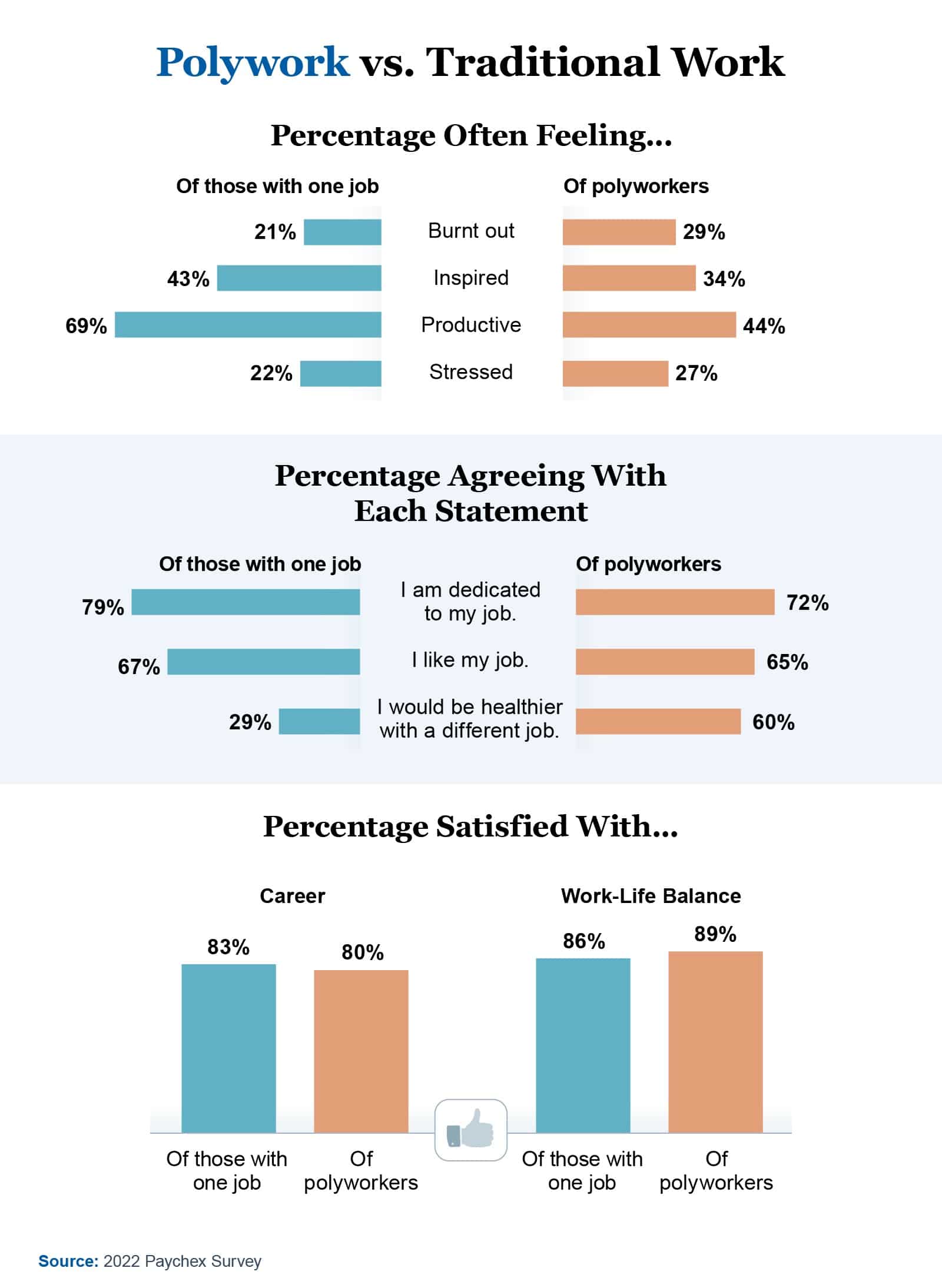
Some polyworkers are self-reportedly less dedicated to their jobs. They also generally like their jobs less and think they would be healthier if they had a different one. Even polyworkers working multiple jobs out of desire rather than necessity report these same sentiments.
Hiring a Polyworker
Higher levels of burnout and stress aren’t the only issues polyworkers face. To find out how hard it might be for them to land the additional jobs they desire, we asked over 200 hiring managers how they feel about candidates already working other jobs.
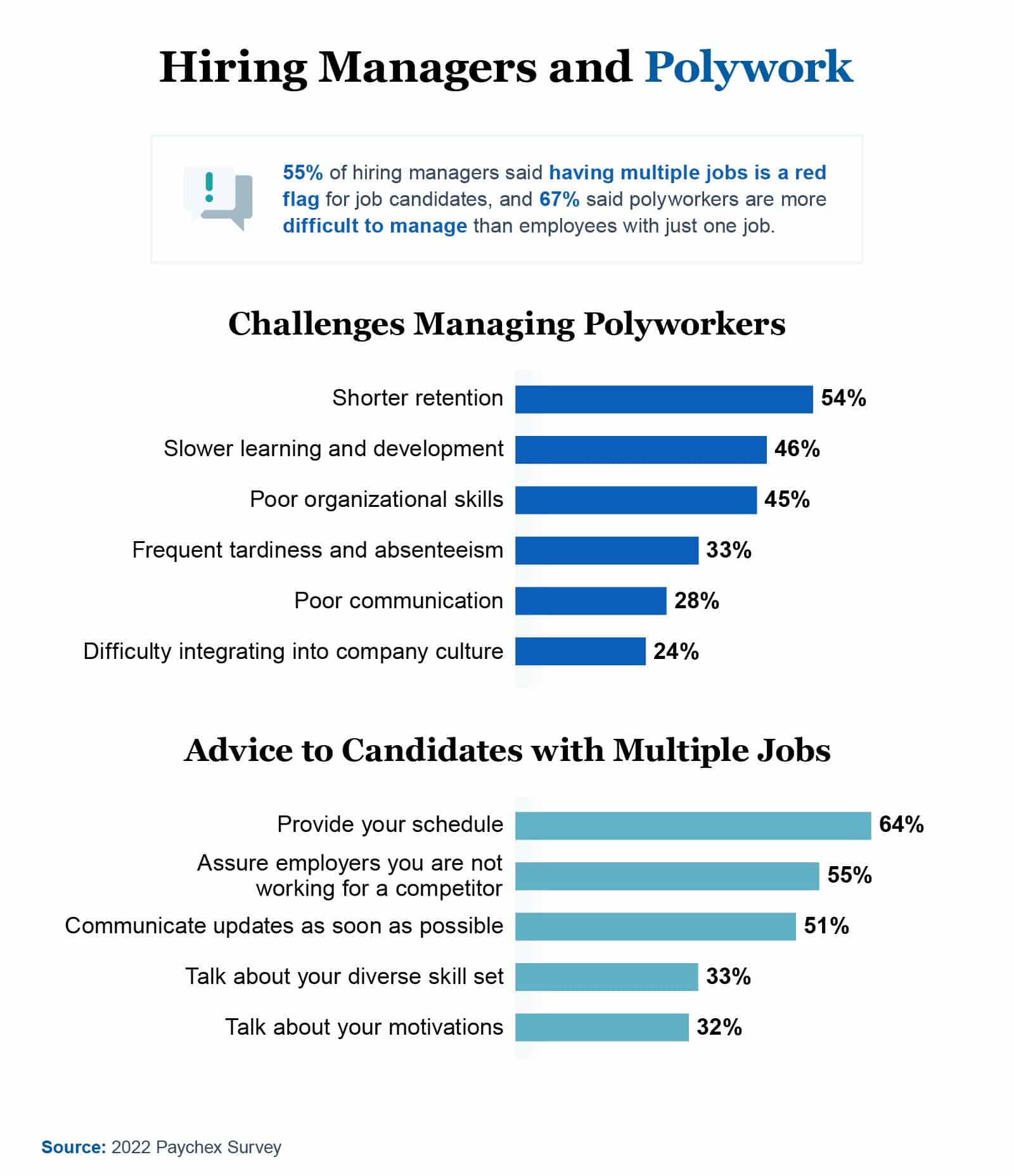
For polyworkers on the job hunt, hiring managers have some advice to give. The most important thing is to be transparent about your work schedule, so managers know when you’re available and when you’re not. They also appreciate knowing that they are competing with your other employers for your labor. Cover these bases in order to boost your chances of landing your next gig.
Over half of hiring managers say polyworking candidates immediately raise a red flag, and more than two-thirds say they’re more challenging to manage than single-job employees. Manager also believe polyworkers don’t stick around as long, are slower at learning and developing skills, and demonstrate poor organizational skills.
The Constant Hustle
The appeal of polywork is rising, but so far, people living in New York, New Jersey, and California are most interested in doing it. Most of the polyworkers we surveyed have held multiple jobs for at least three years with no plans to scale back, and more than half were Gen Z freelancers preferring remote work.
The flexibility and freedom of that lifestyle are simply too good for many to pass up, and quitting it could result in hardships like having to move or struggling to keep up with inflation. Is polywork here to stay, or will the traditional work model dominate once more? To each their own, but we’ll be observing these trends well into the future.
Methodology
We surveyed 1,011 people in October 2022 about their work experience. Among them were 707 polyworkers and 304 people with only one job. Generationally, 11% were Gen Zers, 55% were millennials, 20% were Gen Xers, and 14% were baby boomers. Additionally, 57% were men, and 43% were women. We also surveyed 205 hiring managers. Finally, we looked at the search volume for the terms “polywork,” “gig work,” and “side hustles” in each U.S. state as well as the 25 most populous cities from January 1, 2019 through October 1, 2022.
About Paychex
As a leading provider of integrated human capital management solutions, Paychex offers services for your HR, payroll, retirement plan, employee benefit, and business insurance needs.
Fair Use Statement
If you know any polyworkers who might be interested in our findings, feel free to share this article with them. We just ask that you only do so for noncommercial use, and provide a link back to this original page so the contributors can earn credit for their work.
Tags







